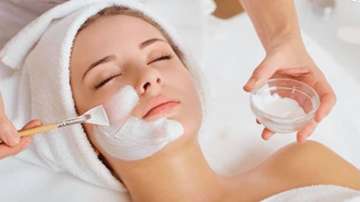Skincare myths you should stop believing right now!
The beauty world is full of myths and arguably even more so when it comes to skincare. The fact is that a lot of skincare advice just doesn’t work, and some skincare myths can even cause a lot of harm. Here are 9 skincare myths you should stop believing.

India TV Lifestyle Desk
New DelhiPublished : Jun 09, 2021 14:50 IST Updated : Jun 09, 2021 14:50 IST
Everyone wants a clear and radiant complexion. But achieving perfect and clear skin depends more on the ability to discern fact from fiction than how diligently we follow a cleansing regimen or how much we spend on products. The beauty world is full of myths and arguably even more so when it comes to skincare. The fact is that a lot of skincare advice just doesn’t work, and some skincare myths can even cause a lot of harm. Be it the more recent trend of gua sha tools and jade rollers that apparently boost circulation to the age-old belief that blackheads can be scrubbed away.
Here are 9 skincare myths you should stop believing:
● Scrubbing every day will keep the skin clean - Scrubbing the face every day only removes the natural sebum and suppleness of the skin. Scrubs are generally very harsh which can cause acne and random breakouts that only cause more damage.
● You need to exfoliate your skin- A common skincare myth is that you need to exfoliate. Skin naturally sheds its superficial keratinocytes about once every month. You do not need to undergo peels, facials, or dermabrasion to exfoliate. Also you need not to use anything abrasive on your skin to achieve this.
● Cloudy days don't need sunscreen - With or without clouds, the harmful UV rays reach to the skin and can cause damage. So always ensure to lather up sunscreen at least twice a day to prevent age and pigmentation caused by sun exposure.
● Toner is the basic and important part of an acne skincare regimen- People who have acne prone skin are often looking for skincare products to combat their oily skin. Toners are considered as a way to cleanse the skin of excess oil after washing. Washing the face with a gentle cleanser and water is adequate to thoroughly cleanse the face. Your skin does not need to always be squeaky clean and stripped of all its natural oils. Toners are generally formulated with alcohols, which can produce drying effects that compromise the skin and cause free-radical damage.
● Essential oils cure skin problems- But the fact is that essential oils cause far more problems for the skin. Because essential oils contain volatile fragrant compounds. When it is applied topically, it can trigger an inflammatory reaction that disrupts the skin’s barrier, depleting it off vital substances which ultimately lead to a range of skincare woes.
● You don’t need a retinol until age 50- Retinol is the ‘gold standard of skincare’ and will continue to stay that way for any age. Retinol increases the production of collagen and skin cell turnover, helps to treat acne, unclog pores, minimize fine lines and wrinkles, and even out skin tone. So, start using retinol in the mid-late 20s in order to prevent damage from occurring. It’s easier to prevent wrinkles.
● Moisturizer is not necessary for oily skin- Oily skin can still be dehydrated. It can contribute to the excessive oil production to overcompensate for that dehydration. Using a moisturizer regularly can ultimately leave the skin less oily because it will help the oil production balance out.
● Eye creams don’t do anything- An eye cream can have many benefits as it contains the right ingredients for skin benefits and is formulated for the specific skin concerns. An eye cream with caffeine can help to control inflammation in case of the appearance of dark circles or puffiness due to fatigue and make the under eyes appear brighter. A perfect eye cream should be combined with smoothing, hydrating, and brightening ingredients, such as hyaluronic acid, vitamin C, and retinol, as the combination can eliminate fine lines, wrinkles, and give the skin an overall youthful appearance.
● If retinol irritates your skin, stop using it- Retinol is the most effective anti-aging product, but it also comes with some irksome side effects, such as redness, dryness, and flaking. If you feel any type of irritation, do not ditch the retinol entirely, but rather to change how and when you're using it. In this condition, Instead of stopping the use of retinol completely, you should decrease the frequency of use to every other night, or even every third night, then slowly increase as tolerated.
-Inputs by Dr. Ajay Rana, renowned Dermatologist and Aesthetic Physician